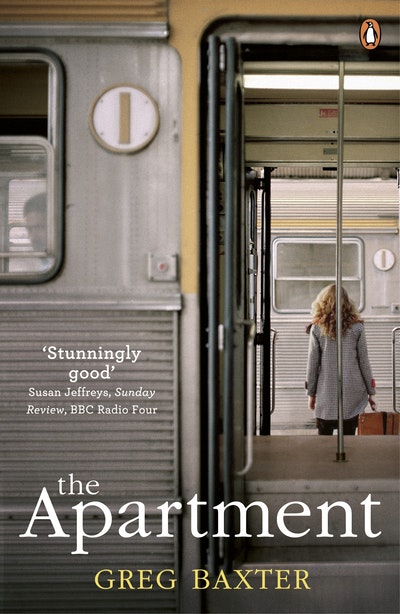- Published: 14 June 2013
- ISBN: 9780241958025
- Imprint: Penguin General UK
- Format: Paperback
- Pages: 240
- RRP: $26.00
The Apartment
- Published: 14 June 2013
- ISBN: 9780241958025
- Imprint: Penguin General UK
- Format: Paperback
- Pages: 240
- RRP: $26.00
Admirable for its scope, ambition and unashamed seriousness of purpose, as well as its willingness to take stylistic and structural risks
Julie Myerson, Observer
Stunningly good
Susan Jeffreys, Saturday Review, BBC Radio 4
Imagine you're on a roller-coaster ... suddenly, without warning, it tips vertiginously, so quickly that your chest constricts and while you're there, suspended, momentarily, at the apex of this roller-coaster, you're aware suddenly of a kind of clarity, a totally new perspective on everything below. Greg Baxter's The Apartment is a bit like this ... Full of unshowy wisdom and surprising moments of beauty
Sunday Telegraph
Baxter's superbly elegant, understated writing explores the dynamics of America's relationship with the rest of the world
The Times
A wonderful, horrible, wise novel
Dazed & Confused (Book of the Month)
His protagonist is not merely struggling beneath the weight of the violence in his own life story; he grapples with the larger sense of history that infuses the text with an effect that recalls WG Sebald. ... There's a maturity to The Apartment not often found in debut novels.
Lucy Scholes, The Independent
An interesting, honourable novel
James Lasdun, The Guardian
A writer of considerable gifts ... Baxter, who now lives in Berlin, is so good at conjuring up the atmosphere of his chilly and crowded city (probably Eastern European and probably fictional) and the character of its inhabitants that you come to feel that you're living there among them in their noisy, bustling cafes and their freezing thoroughfares. ... Baxter shows mastery, too, in his vividly realised characters, especially the charming Saskia
Irish Independent
Impressive ... The language is tight, with each word weighted and anything showy or extraneous rigidly excluded
Dubliner
Contains moments of shocking impact, set out vividly against the palely drawn background.
TLS
A remarkably assured and often poetic piece of work
Hot Press
A terse and subtle tour-de-force
Cara
A slim but sure tale of love, death and imperialism
RTE Guide
A quietly compelling and provocative work
Sunday Business Post
A dark and sinewy novel, written with sparse clarity and affecting subtlety
Stuart Evers, Observer Books of the Year
In a year marked by epics, it's a relief to delve into this quiet, surprisingly tense debut novel - small enough to stuff in a stocking but packing a huge emotional punch
Entertainment Weekly
A novel of subtle beauty and quiet grace; I found myself hanging on every simple word, as tense about the consequences of a man finding an apartment as if I were reading about a man defusing a bomb. ... It is one of the best novels I have read in a long time. ... With elegant restraint, Baxter layers the narratives, anecdotes and experiences in the manner of life as continuous essay, the topic of which might be stated as, "What is a right way to be in the world?" ... It is very much to Baxter's credit that he presents this struggle as if it were thriller, love story, philosophical novel and dark comedy combined, in a novel not liek a bullet but like an arrow flying straight to the heart of the matter.
New York Times Book Review
A quiet and powerful read through and through. Baxter's clean and direct prose generates its own momentum. He chooses not to create a tidy drama where characters are explained by their pasts. Rather, he creates something bigger and more true.
Daily Beast
Compelling ... captures the mood of the current moment and what seems to be a new "lost generation", one formed not so much by exposure to violence, as immunity to and alienation from it. Once upon a time, there was no place like home; in Mr. Baxter's world, home, it seems, is no place.
New York Times
Absorbing, atmospheric and enigmatic ... With its disorienting juxtaposition of the absolutely ordinary and the strange and vaguely threatening, the novel evokes the work of Franz Kafka and Haruki Murakami, while its oblique explorations of memory suggest a debt to W.G. Sebald
Los Angeles Times




